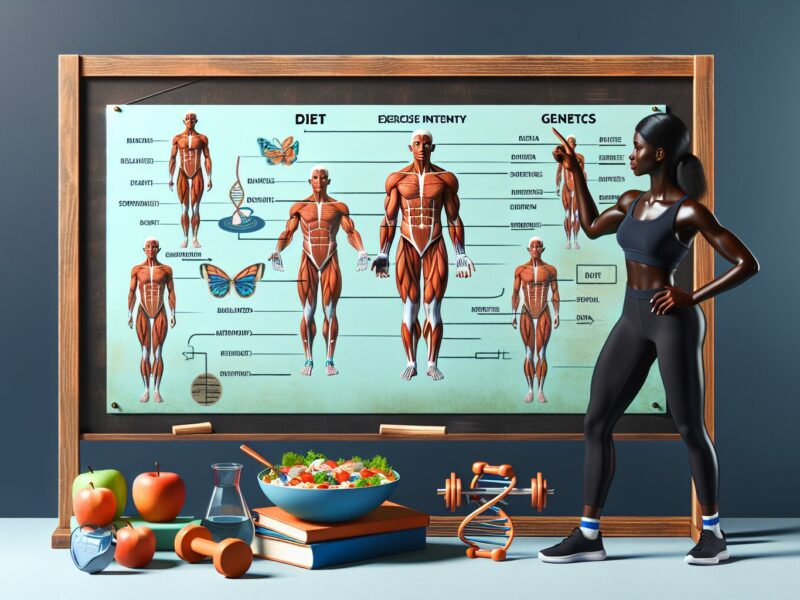If you’ve ever wondered how to build muscle mass quickly and effectively, look no further. This article will provide you with valuable insights and techniques to help you achieve your fitness goals. Whether you’re a beginner or an experienced gym-goer, the strategies outlined here will assist you in maximizing your results in the shortest possible time. So, if you’re ready to take your fitness journey to the next level and transform your physique, read on to discover the secrets of building muscle mass fast.
Importance of Building Muscle Mass
Building muscle mass is not only beneficial for those looking to tone their bodies and achieve a more aesthetic appearance, but it also plays a crucial role in enhancing strength and overall physical performance. Increasing muscle mass allows you to lift heavier weights and perform everyday activities with ease. Whether you’re an athlete, a fitness enthusiast, or simply want to improve your overall health, focusing on building muscle mass should be a part of your fitness routine.
Enhances Strength and Performance
One of the primary benefits of building muscle mass is the enhancement of strength and performance. When you engage in resistance training exercises, such as weightlifting, your muscles adapt and grow stronger over time. This increased strength allows you to tackle physical activities with greater ease and efficiency. Whether it’s lifting heavy objects, participating in sports, or even performing basic tasks like carrying groceries, having a stronger and more muscular physique can make a significant difference in your overall performance.
Boosts Metabolism
Another key aspect of muscle mass is its impact on metabolism. Muscle tissue is metabolically active, meaning it requires more energy (calories) to maintain compared to fat tissue. By building muscle mass, you can increase your resting metabolic rate, which is the number of calories your body burns at rest. This boost in metabolism can help with weight management and improve overall body composition by reducing body fat percentage. Therefore, building muscle mass not only enhances strength and performance but also contributes to a more efficient metabolism and a healthier body.
Improves Body Composition
Building muscle mass can have a significant impact on your body composition. Increasing lean muscle mass while decreasing body fat percentage can lead to a more sculpted and toned physique. Unlike solely focusing on weight loss, which can sometimes result in muscle loss, building muscle mass allows you to maintain and even increase your muscle mass while reducing body fat. This results in a more defined and proportionate physique, giving you the body shape that you desire. Additionally, an improved body composition can enhance your overall confidence and self-esteem, leading to a positive impact on various aspects of your life.
Diet and Nutrition
Diet and nutrition play vital roles in building muscle mass and achieving your fitness goals. To effectively build and maintain muscle, it is essential to pay attention to the following aspects of your diet:
Caloric Surplus
To build muscle mass, it is necessary to consume more calories than you burn. This is known as a caloric surplus. However, it is important to strike a balance and avoid excessive calorie intake, as it can lead to unwanted weight gain in the form of fat. Aim for a moderate caloric surplus of approximately 250-500 calories per day. This will provide your body with the necessary energy to fuel muscle growth without excessive fat accumulation.
Protein Intake
Protein is the building block of muscle tissue, making it a crucial macronutrient for muscle growth. Including an adequate amount of protein in your diet helps repair and rebuild muscle fibers that are broken down during exercise. Aim to consume around 1.2-2 grams of protein per kilogram of body weight per day. Good sources of protein include lean meats, poultry, fish, eggs, dairy products, legumes, and plant-based proteins like tofu and tempeh.
Carbohydrate Consumption
Carbohydrates serve as the primary energy source for intense workouts and are essential for fueling muscle growth. Focus on consuming complex carbohydrates like whole grains, fruits, vegetables, and legumes. These provide a steady release of energy and essential nutrients. However, avoid excessive consumption of simple sugars and processed carbohydrates, as they can lead to spikes in blood sugar levels and unwanted weight gain.
Healthy Fats
While it’s important to monitor fat intake, including healthy fats in your diet is crucial for overall health and hormone production. Healthy fats, such as those found in avocados, nuts, seeds, and olive oil, provide essential fatty acids that support muscle growth and optimize hormone levels. Aim to include a moderate amount of healthy fats in your diet while maintaining a balance with other macronutrients.
Hydration
Proper hydration is often overlooked but is crucial for optimal muscle function and growth. Water plays a significant role in various physiological processes, including nutrient transport, waste removal, and temperature regulation. Aim to drink at least 8 cups (64 ounces) of water per day, and increase your intake during intense workouts or in hot weather conditions. Additionally, consider consuming electrolyte-rich drinks or adding electrolyte supplements to replenish lost minerals during exercise.
Resistance Training
Resistance training is the cornerstone of building muscle mass. It involves performing exercises that stimulate your muscles to adapt and grow. Here are important factors to consider when engaging in resistance training:
Compound Exercises
Compound exercises are multi-joint movements that engage multiple muscle groups simultaneously. Incorporating compound exercises into your workout routine is essential for maximizing muscle growth and overall strength. Examples of compound exercises include squats, deadlifts, bench presses, and pull-ups. These exercises target multiple muscle groups at once, allowing you to lift heavier weights and stimulate more muscle fibers.
Progressive Overload
Progressive overload refers to gradually increasing the intensity, volume, or workload of your workouts over time. This ensures that your muscles are constantly challenged and forced to adapt and grow. Aim to progressively increase the weight you lift, the number of sets and repetitions, or the overall training volume as you become stronger and more comfortable with your current routine.
Frequency and Volume
The frequency and volume of your training sessions play a significant role in building muscle mass. Aim to perform resistance training workouts at least 2-3 times per week to allow sufficient time for muscle recovery and growth. Focus on targeting different muscle groups on different days to avoid overtraining and promote balanced muscle development. Additionally, gradually increase the volume (total sets and repetitions) of your workouts over time to ensure continuous progress.
Rest and Recovery
Rest and recovery are often underestimated but are crucial for muscle growth. During resistance training, muscle fibers are broken down, and the rebuilding process occurs during rest periods. Make sure to incorporate rest days into your routine and allow your muscles to recover and repair. Additionally, prioritize getting enough sleep each night, as this is when the majority of muscle repair and growth occurs. Aim for 7-9 hours of quality sleep per night to support your muscle-building efforts.
Optimizing Hormonal Balance
Optimizing hormonal balance is an essential component of building muscle mass. Hormones such as testosterone, growth hormone, and cortisol play crucial roles in muscle growth and recovery. Here are some factors to consider for optimal hormonal functioning:
Testosterone Levels
Testosterone is the primary hormone responsible for muscle growth and development. Engaging in regular resistance training, particularly compound exercises and high-intensity workouts, can naturally increase testosterone levels. Additionally, maintaining a healthy lifestyle, managing stress levels, and consuming an adequate amount of healthy fats and protein can also support healthy testosterone levels.
Growth Hormone Release
Growth hormone (GH) is a key hormone involved in muscle growth and repair. Certain lifestyle factors can help optimize growth hormone release. Aim to get high-quality sleep, as GH is primarily released during the deep stages of sleep. Engaging in intense resistance training, particularly exercises that target large muscle groups, can also stimulate the release of growth hormone.
Cortisol Management
Cortisol is a stress hormone that, when elevated for prolonged periods, can have a negative impact on muscle growth. Chronic stress, lack of sleep, and excessive cardio or endurance exercise can contribute to elevated cortisol levels. Practice stress reduction techniques such as meditation, deep breathing exercises, or engaging in hobbies to manage cortisol levels and promote a more anabolic environment for muscle growth.
Supplementation
While proper nutrition should always be the foundation for building muscle mass, certain supplements can support your efforts. Here are some commonly used supplements for muscle growth:
Protein Powders
Protein powders, such as whey or plant-based protein powders, can be a convenient way to meet your daily protein requirements. They are quick and easily digestible, making them ideal for post-workout recovery. However, it’s important to prioritize whole food sources of protein and use protein powders as a supplement when needed.
Creatine Monohydrate
Creatine monohydrate is a well-researched supplement that has been shown to enhance muscle strength and power. It works by increasing the availability of ATP, the primary energy source for muscle contractions. Creatine supplementation is particularly beneficial for high-intensity, short-duration activities like weightlifting.
Branched-Chain Amino Acids (BCAAs)
BCAAs are essential amino acids that play a crucial role in muscle protein synthesis and recovery. Supplementing with BCAAs before or during workouts can help reduce muscle breakdown and improve muscle recovery. However, it’s important to note that consuming an adequate amount of protein from whole food sources will generally provide sufficient BCAA intake.
Beta-Alanine
Beta-alanine is an amino acid that can help increase muscle carnosine levels. Carnosine acts as a buffer in muscles, reducing the build-up of lactic acid during intense workouts. By delaying fatigue, beta-alanine supplementation may improve overall workout performance, increase training volume, and support muscle growth.
Fish Oil
Fish oil is rich in omega-3 fatty acids, which have anti-inflammatory properties and can support muscle recovery and reduce exercise-induced muscle soreness. Additionally, omega-3 fatty acids play a role in overall health, cardiovascular function, and brain health.
Sleep and Stress Management
Getting adequate sleep and managing stress levels are often overlooked aspects of building muscle mass. Here’s why they are crucial for optimal muscle growth:
Quality and Quantity of Sleep
During sleep, the body repairs and rebuilds damaged muscle fibers, leading to muscle growth and recovery. Aim for 7-9 hours of quality sleep per night. Create a sleep-friendly environment by keeping your bedroom dark, cool, and quiet. Establish a consistent sleep routine, avoiding excessive caffeine and electronic device use before bed.
Stress Reduction Techniques
Chronic stress can raise cortisol levels, which can hinder muscle growth and recovery. Incorporate stress reduction techniques into your daily routine, such as meditation, deep breathing exercises, yoga, or engaging in activities you enjoy. Find healthy ways to manage stress and create a more anabolic environment for muscle growth.
Avoid Overtraining
Overtraining can impede muscle growth and increase the risk of injury. It’s essential to find a balance between challenging your muscles and allowing them to recover. Here’s how to avoid overtraining:
Balancing Workouts
Avoid excessively long or intense workouts that may put excessive strain on your muscles and lead to overtraining. Gradually increase the intensity and volume of your workouts over time, allowing your muscles to adapt and recover between sessions.
Allowing Adequate Rest
Incorporate rest days into your training schedule. This allows your muscles time to repair and recover, leading to more significant gains in muscle mass. Listen to your body and take additional rest days if you feel excessively fatigued or sore.
Listening to Your Body
Pay attention to how your body feels and adjust your training accordingly. Soreness and fatigue are normal, but excessive, persistent pain or fatigue may indicate overtraining. Be mindful of warning signs such as decreased performance, disturbed sleep, increased injuries, or changes in appetite and mood. If necessary, consult with a fitness professional to reassess your training program.
Progress Tracking
Monitoring your progress is essential to stay motivated and assess whether your efforts are paying off. Here are effective ways to track your muscle-building journey:
Body Measurements
Track changes in your body composition by measuring body circumferences, such as waist, hips, chest, arms, and thighs. While the number on the scale may not accurately reflect the progress you’ve made, changes in body measurements can provide a more accurate picture of your muscle gain and fat loss.
Strength Progression
Record your strength gains by tracking the weights you lift, the number of sets and repetitions performed, and the level of difficulty of each exercise. Gradually increasing the weights or reps over time indicates progress in muscle growth and strength.
Periodic Fitness Assessments
Consider periodic fitness assessments to objectively measure your progress. This can include tests such as body composition analysis, strength tests, or endurance assessments. These assessments provide valuable feedback and help identify areas that need improvement.

Consistency and Patience
Building muscle mass is a journey that requires consistency and patience. Keep the following points in mind:
Setting Realistic Goals
Set realistic and achievable goals based on your individual circumstances and timeline. Building muscle mass takes time and effort, and results will not happen overnight. Focus on gradual progress and celebrate each milestone along the way.
Sticking to a Routine
Consistency is key when it comes to building muscle mass. Stick to a regular exercise routine that includes resistance training, adequate rest, and proper nutrition. Make it a habit to prioritize your workouts and make healthy choices each day.
Long-Term Approach
Building muscle mass is not a short-term endeavor. It requires a long-term commitment to a healthy and balanced lifestyle. Embrace the process, enjoy the journey, and remember that sustainable muscle growth occurs over months and years rather than days or weeks.
Seek Professional Guidance
If you are new to exercise or looking to optimize your muscle-building efforts, seeking professional guidance can be beneficial. Consider the following professionals who can help:
Personal Trainers
A certified personal trainer can create a well-structured workout program tailored to your goals and abilities. They can provide guidance on proper exercise techniques, ensure proper form, and modify your program as you progress.
Nutritionists
Consulting with a registered nutritionist or dietitian can help optimize your diet and ensure you are meeting your nutritional needs for muscle growth. They can provide personalized advice on macronutrient distribution, portion sizes, and general dietary guidelines.
Physical Therapists
If you have existing injuries or physical limitations, a physical therapist can help develop a safe and effective exercise program. They can provide exercises and techniques to prevent further injuries and ensure proper functional movement patterns.
By incorporating the above strategies into your fitness routine and lifestyle, you can optimize muscle growth, enhance performance, and achieve your desired physique. Remember to approach your muscle-building journey with dedication, consistency, and patience, and enjoy the many benefits that building muscle mass brings to your overall health and well-being.





